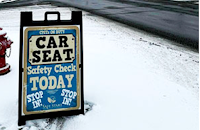 |
| High school students in Kansas participate
in the Seatbelts Are For Everyone program. (Photo via RHIhub) |
Rural roads have more space and less traffic, which can lead drivers to speed unintentionally, leave their lanes, and head into oncoming traffic. Rural drivers are also less likely to observe seat belt laws. Experts say rural drivers "'should be treated as a distinct market segment for seat belt messaging and public awareness campaigns,' and that changing rural drivers' beliefs about seat belts 'may help reduce the disparity between rural and urban traffic fatality rates,'" Kauffman writes. "In the event of a crash, proper seat belt use can be the difference between life and death. . . . Roughly half of all people killed in car crashes in 2021 were unrestrained."
Community-led programs may be "more effective at encouraging seat belt use in rural areas than national or government-led campaigns, experts suggest." Kauffman reports, "One such program, the Seatbelts Are For Everyone program, formed in rural Crawford County, Kansas, in 2008. At the time, Crawford County had one of the lowest rates of seat belt use among teen drivers in the state. . . . In its first year, one of the six Crawford County high schools that piloted the program went from a 57% seat belt compliance rate to an 82% compliance rate."
 |
| Safe Start advertises free car seat checks. (Photo via RHIhub) |
No comments:
Post a Comment